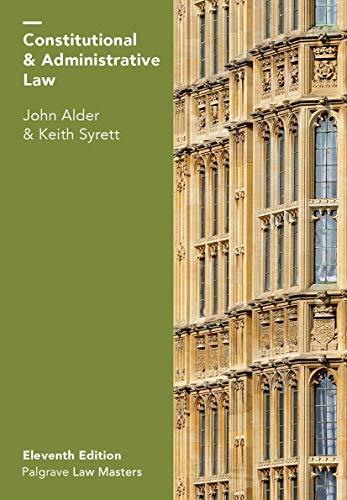Question
Here Comes the Judge Robert Ruehlman, an Ohio Common Pleas Court Judge in Hamilton county Ohio claims he regularly calls U.S. Immigration and Customs Enforcement
Here Comes the Judge
Robert Ruehlman, an Ohio Common Pleas Court Judge in Hamilton county Ohio claims he regularly calls U.S. Immigration and Customs Enforcement on defendants in his courtroom when he suspects they could be in the country illegally. "I call ICE in a minute. I have no problem calling ICE," said Judge Ruehlman, who states that he calls ICE "10 to 20" times a year. "I do. I do not think every judge does that. I think I'm the only judge that does that, but I do. I think it's important." Further, Ruehlman says that he depends on his own intuition as a guide for when to make such calls, and that he typically feels the need to call when the defendant speaks Spanish or needs an interpreter. 49
The Hamilton county sheriff has expressed concern about the practice, asserting that "anyone who is a victim or witness to a crime should be able to fully participate in the judicial process to further justice and remove dangerous criminals from our streets." The judge, on the other hand, stated, "I don't see where the outrage is. Number one, they're an illegal alien. They're not supposed to be here, so they're breaking the law. Number two, they're in front of me for a felony." He claims his hunches have never been wrong.50
It is common practice across branches of law enforcement to rely on intuition, training, and experience in the pursuit of criminals. The subjective judgment of police officers is defended by law enforcement as a critical tool on which they depend to perform their jobs. However, the subjectivity of this tool has become increasingly difficult to defend in light of a long string of highly publicized police killings of unarmed people of color. American law enforcement has a long and troubled history with racial profiling.
"It's not racial profiling. It's just common sense," Ruehlman said. "They speak Spanish, they're charged with carrying a lot of drugs, and they're not from here. It's pretty clear they're illegal immigrants, you know, and if it turns out they are a citizen, then there's no harm, no foul." In a statement concerning Ruehlman, ICE spokesman Khaalid Walls said courthouses are often the only place agents can find a person, and visitors are typically screened upon entry to search for weapons and other contraband, so the safety risks for the arresting ICE officers and for the arrestee are substantially diminished.
Legally, the matter seems to be up to the discretion of the presiding judge concerning whether immigration police should be consulted when a suspected offender is present in court. Nancy Sullivan, an advocate for migrants, said she's conflicted in this case. "I don't think this is the best way to go about it," Sullivan said. "Nobody wants a convicted criminal on the street who hasn't served time or done whatever, but I think it has a very chilling effect on getting crime victims or witnesses to come to court."51 Judge Charles Kubicki, the presiding and administrative judge for Common Pleas Court, said that as far as he knows, there are no rules or laws that prevent judges from contacting immigration agents. He added there are also no laws requiring judges to do so, either.
Based on the passage
1. re-evaluate this case from a descriptive point-of-view. Is there more than one descriptive claim that could be applied? Now that you have more ethical training, are they different from the first time you analyzed the case? If so, how have they changed and why?
2. How does an emphasis on character and living an excellent life shape one's deliberations (think normatives) in this situation?
3. How does consequentialist reasoning shape one's deliberation in this situation?
4. How does duty base-ethics shape one's deliberation in this situation?
5. What is left out? Where might these different deliberations create conflict? Please be specific.
6. How does the moral assessment of the court (systems, rules, institutions) differ from our personal decision-making? Can we draw a line between the two?
Step by Step Solution
There are 3 Steps involved in it
Step: 1

Get Instant Access to Expert-Tailored Solutions
See step-by-step solutions with expert insights and AI powered tools for academic success
Step: 2

Step: 3

Ace Your Homework with AI
Get the answers you need in no time with our AI-driven, step-by-step assistance
Get Started


